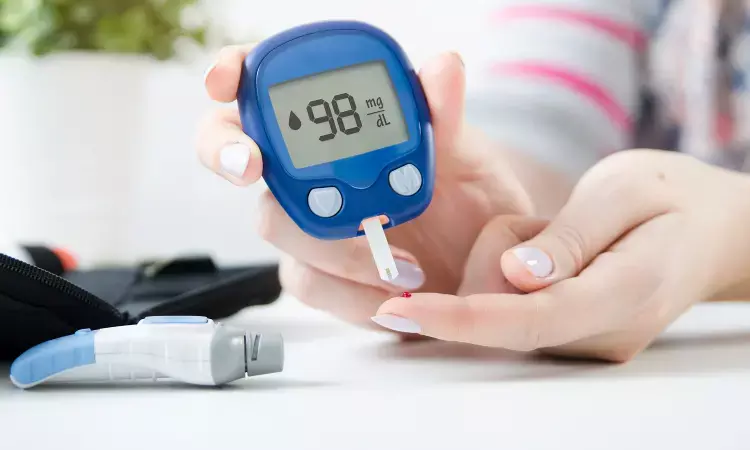- Home
- Medical news & Guidelines
- Anesthesiology
- Cardiology and CTVS
- Critical Care
- Dentistry
- Dermatology
- Diabetes and Endocrinology
- ENT
- Gastroenterology
- Medicine
- Nephrology
- Neurology
- Obstretics-Gynaecology
- Oncology
- Ophthalmology
- Orthopaedics
- Pediatrics-Neonatology
- Psychiatry
- Pulmonology
- Radiology
- Surgery
- Urology
- Laboratory Medicine
- Diet
- Nursing
- Paramedical
- Physiotherapy
- Health news
- Fact Check
- Bone Health Fact Check
- Brain Health Fact Check
- Cancer Related Fact Check
- Child Care Fact Check
- Dental and oral health fact check
- Diabetes and metabolic health fact check
- Diet and Nutrition Fact Check
- Eye and ENT Care Fact Check
- Fitness fact check
- Gut health fact check
- Heart health fact check
- Kidney health fact check
- Medical education fact check
- Men's health fact check
- Respiratory fact check
- Skin and hair care fact check
- Vaccine and Immunization fact check
- Women's health fact check
- AYUSH
- State News
- Andaman and Nicobar Islands
- Andhra Pradesh
- Arunachal Pradesh
- Assam
- Bihar
- Chandigarh
- Chattisgarh
- Dadra and Nagar Haveli
- Daman and Diu
- Delhi
- Goa
- Gujarat
- Haryana
- Himachal Pradesh
- Jammu & Kashmir
- Jharkhand
- Karnataka
- Kerala
- Ladakh
- Lakshadweep
- Madhya Pradesh
- Maharashtra
- Manipur
- Meghalaya
- Mizoram
- Nagaland
- Odisha
- Puducherry
- Punjab
- Rajasthan
- Sikkim
- Tamil Nadu
- Telangana
- Tripura
- Uttar Pradesh
- Uttrakhand
- West Bengal
- Medical Education
- Industry
Finerenone beneficial for CV, and kidney outcomes irrespective of GLP-1 RA use: ADA

Chicago, IL: The use of glucagon-like peptide-1 receptor agonist (GLP-1 RA) does not modify the benefits of finerenone on composite cardiovascular (CV) and kidney outcomes in patients with type 2 diabetes and chronic kidney disease (CKD), says a recent study.
The researchers observed an increased effect for urine albumin-to-creatinine ratio (UACR) reduction indicating a different mechanism of albuminuria reduction. The findings of the study were presented at the 2022 American Diabetes Association Annual Meeting in New Orleans, Louisiana, and subsequently published in the journal Diabetes.
In the FIDELIO-DKD and FIGARO-DKD studies, finerenone was shown to reduce the risk of cardiorenal outcomes in patients with CKD and T2D. In FIDELIO-DKD, the effects of finerenone on kidney and CV outcomes were consistent regardless of GLP-1RA use, but analyses were better powered for evaluating the changes in UACR.
Peter Rossing and colleagues extended these analyses to patients in both studies FIDELITY analysis), thus encompassing a larger population with broader inclusion criteria.
The study included patients with T2D and CKD (UACR ≥30-<300 mg/g and eGFR ≥25-≤90 mL/min/1.73 m2, or UACR ≥300-≤5000 mg/g and eGFR ≥25 mL/min/1.73 m2) treated with optimized renin-angiotensin system blockade. They were randomized to either finerenone or placebo.
The effects of finerenone on CV (nonfatal myocardial infarction, CV death, hospitalization for heart failure, or, nonfatal stroke) and kidney (sustained ≥57% eGFR decline, kidney failure, or renal death) composite outcomes, and UACR at month 4, were analyzed by GLP-1RA use.
Based on the study, the researchers reported the following:
- Of 13026 patients, 944 (7.2%) received GLP-1RAs at baseline.
- Results were consistent irrespective of GLP-1RA use at baseline for the CV composite outcome (hazard ratio [HR] 0.76 with GLP-1RA; HR 0.87 without GLP-1RA), and the kidney composite outcome (HR 0.82 with GLP-1RA; HR 0.77 without GLP-1RA).
- A greater reduction in UACR was observed with finerenone in patients taking GLP-1RA at baseline (placebo-corrected change -38% with GLP-1RA and -31% without GLP-1RA use).
- Incidence of hyperkalemia was similarly increased with finerenone irrespective of GLP-1RA use at baseline.
"The benefits of finerenone on composite CV and kidney outcomes in patients with CKD and T2D are not modified by the use of GLP-1RA at baseline, with an increased effect observed for UACR reduction, indicating a different mechanism of reduction in albuminuria," the authors conclude.
Reference:
PETER ROSSING, STEFAN ANKER, GERASIMOS FILIPPATOS, BERTRAM PITT, LUIS M. RUILOPE, VIVIAN FONSECA, GUILLERMO E. UMPIERREZ, LUIZA CARAMORI, MARC LAMBELET, PRABHAKAR VISWANATHAN, ROBERT LAWATSCHECK, AMER JOSEPH, GEORGE BAKRIS; 22-OR: Finerenone in Patients across the Spectrum of CKD and T2D by GLP-1RA Use. Diabetes 1 June 2022; 71 (Supplement_1): 22–OR. https://doi.org/10.2337/db22-22-OR
Dr Kamal Kant Kohli-MBBS, DTCD- a chest specialist with more than 30 years of practice and a flair for writing clinical articles, Dr Kamal Kant Kohli joined Medical Dialogues as a Chief Editor of Medical News. Besides writing articles, as an editor, he proofreads and verifies all the medical content published on Medical Dialogues including those coming from journals, studies,medical conferences,guidelines etc. Email: drkohli@medicaldialogues.in. Contact no. 011-43720751


